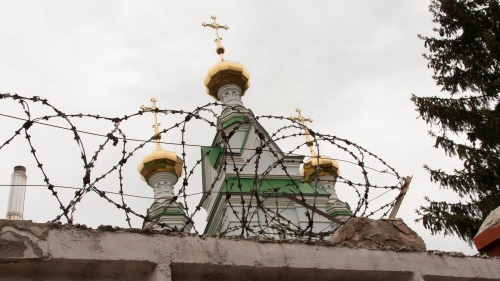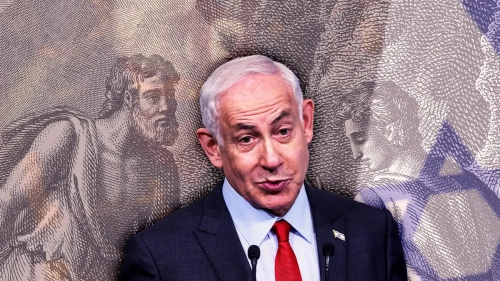Anger in Sudan as Bush Sides Openly with 'Christian' Rebels
The Sudanese government, which has been wooing Washington for months to escape US sanctions and diplomatic isolation, is now furious with the Bush administration because it has revealed its position on the civil war, siding completely and unequivocally with the spectacularly misnamed the Sudanese People's Liberation Movement (SPLM). Mustafa Osman Ismail, Sudan's foreign minister, said on May 6 that tensions between Washington and Khartoum would increase as a result of the hostile speech made by president George W. Bush two days earlier, in which he vowed to end the war, which he claims is against Christians and others unwilling to convert to Islam. The minister also told reporters that Bush's new policy will not lead to peace in his country.
| _________
The president's anti-Sudan thrust reflects the campaign mounted by western, Christian and human-rights groups earlier this year to influence the policy of the new administration. __________ |
Speaking on May 3, Bush described Sudan as "a disaster area for all human rights". He said that he had appointed the administrator of the Agency for International Development, Andrew Natsios, as a special humanitarian coordinator to ensure that American aid to Sudan "goes to the needy, without manipulation by those ravaging that troubled land." Addressing the American Jewish Committee, a Zionist organization, Bush said: "We must turn the eyes of the world upon the atrocities in Sudan". But that was clearly not sufficient for his purposes or those of the committee, and he added: "This is a first step; more will follow." Since by "we" Bush plainly meant "Christians and Jews", and since he was targeting a country they considered to be "ravaged" by "Islamic fundamentalists", he must have known that he was in effect declaring a religious war. The theme of his speech was supposed to be religious tolerance and liberty around the world.
It came as no surprise that the first person to praise Bush's new Sudan policy was Elliot Abrams, a former assistant secretary of state and now chairman of the US Commission on International Religious Freedom. The CIRF is a government body that has been deeply involved in the American Church groups' campaign against Sudan, calling it "the world's most violent abuser of the right to freedom of religion and belief". The commission, which has been advising both Congress and the administration on their recent attacks on Sudan and other Muslim countries, must also have been pleased by Bush's decision to pick out Iran, Iraq, Afghanistan, Cuba and China.
The president's anti-Sudan thrust reflects the campaign mounted by western, Christian and human-rights groups earlier this year to influence the policy of the new administration. The campaign came to a head in March, when Christian Aid published its report, which accused oil-companies operating in the Sudan of funding the "Islamic" government's war on southern Christians. In the US itself, "Republican constituencies, including Christian conservatives", as newspaper reports described them, lobbied Congress and the administration to put an end to the alleged persecution of Christians in southern Sudan. In particular, they called for strong pressure on oil-companies to cease their operations in the Sudan, as Christian Aid has demanded.
The pressure bore fruit at the end of April. A report mandated by Congress, issued on April 30, makes the highly controversial recommendation that the administration use American capital markets to clamp down on foreign companies doing business in countries that suppress religious freedoms. But although this threat is not confined to any single country, Sudan figures in the report more prominently than any other state. The report even says at one point: "The US should prohibit any foreign company from raising capital or listing its securities in US markets as long as it is engaged in the development of oil and gas fields in Sudan."
The companies which will be most affected if the Bush administration implements this recommendation are Talisman Energy of Canada, PetroChina, and Lundeen Oil of Sweden. One French oil-company, Total Fina Elf, which holds the largest concession in the Sudan, also stands to lose, although it has not started operating in the south. The significant point here is that none of the companies with holdings in the Sudan is American. This is clearly unsatisfactory from the point of view of US corporations to which Bush and various congressmen are beholden.
It is not unreasonable to assume that Congress is using religion to blackmail Sudan into committing itself to a secular form of government as a first step to becoming a US surrogate that does business mainly with American corporations. Certainly the second recommendation of the report mandated by congress seeks to close the lead international companies not subject to US economic sanctions enjoy over US firms. It calls for companies to be forced to disclose their involvement in the so-called "countries of concern" (CPCs), a list of which is maintained by the state department.
The report also calls on the state department to add to its list Turkmenistan, Saudi Arabia, Laos and North Korea, while recommending that Uzbekistan, Pakistan, Vietnam and India be monitored for violations.
Apart from their customary arrogance towards other nations, which both the report and Bush's speech exhibit, the Americans clearly believe that Sudan's government has no cards left to play, as it has already destroyed its main bargaining-chip by taking on the country's Islamic movement and imprisoning its leader, Dr Turabi. Sadiq al-Mahdi, the opposition leader and former prime minister, appears to agree. In a newspaper interview on April 29, al-Mahdi said: "The government has declared that it had shed its links with terrorism, and since last June there has been in Khartoum an FBI committee engaged in verifying the truth of the government's declaration."
Sadiq al-Mahdi was commenting on statements by secretary of state Colin Powell before a Congressional committee on April 27 in which he set out the conditions the US demands for better relations with Sudan. Powell said that he had conveyed to Khartoum the following three conditions: cessation of government bombing of the south; an increase in food aid to the region; and the beginning of serious action to get rid of the remnants of 'terrorist organizations' in the country. Al-Mahdi saw these conditions as "acceptable and reasonable".
Even more remarkable was the response of Sudanese information minister, Dr Ghazi Salah. He said that the conditions were "couched in terms more positive than those the previous administration had used." His words reflect the Bashir regime's desperation to be accepted by the West. If the Bashir regime can regard such humiliating terms as acceptable, then Washington is not unrealistic to expect that it will play ball.
______________________________________________
The author writes for Crescent International, a news magazine of the global Islamic movement.

















